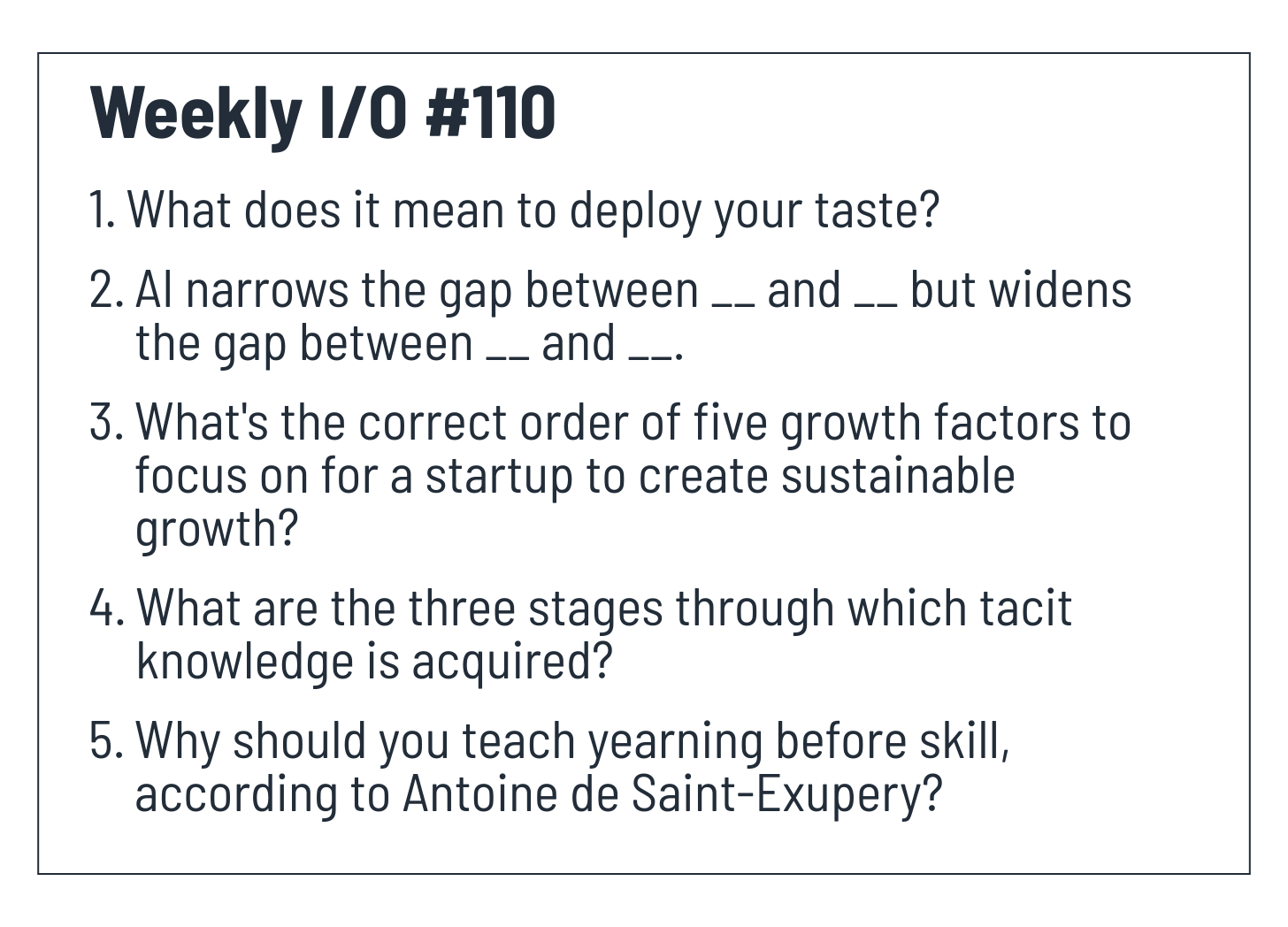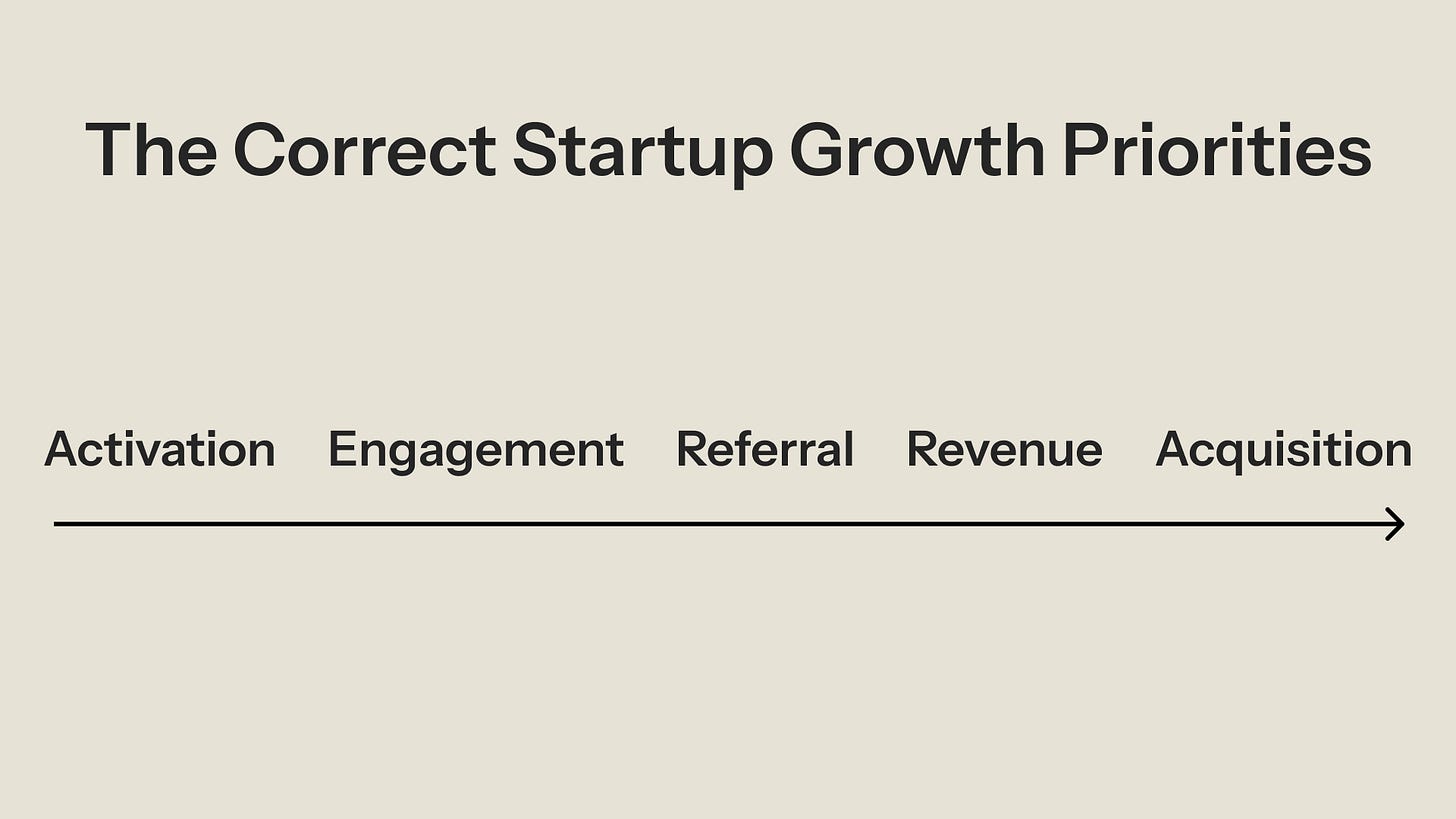How to know if you have good taste, When creation is too easy, Don't invest in marketing before onboarding
Weekly I/O #110: Deploy Taste, Gap between Creation and Meaning, Startup Growth Priorities, Unconscious Competence, Teach Yearning before Skill
If you enjoy reading Weekly I/O, please share it with others who might also like it. You'll have a chance to win a free paid subscription for one, three, or six months.
Hey friends,
Here's a list of things I enjoyed learning this week:
Tamara Winter on tacit knowledge, taste, charisma, agency, social trust
The original growth hacker reveals his secrets | Sean Ellis (author of “Hacking Growth”)
Why Tacit Knowledge is More Important Than Deliberate Practice - Commoncog
Infectious Ideas, Attention, and Action | Nadia Asparouhova & Antimemetics
Input
Here's a list of what I learned this week.
1. If your taste is so good, why aren't you deploying it anywhere? We don't need more cultural critics. We need people who can deploy their taste and shape the world around them.
Podcast: Tamara Winter on tacit knowledge, taste, charisma, agency, social trust
Tamara Winter is the Commissioning Editor of Stripe Press, which published many of the books on my bookshelf, including The Art of Doing Science and Engineering, Pieces of the Action, Poor Charlie's Almanack, Scaling People, and The Dream Machine. Their books largely shape my taste.
In the podcast, Tamara talked about deploying taste. In her words:
"I don't think we need another cultural critic. I think we have enough. I am increasingly uninterested in cultural analysis and way more interested in whether you can deploy it.
It's like the joke, "If you're so smart, why aren't you happy?" If your taste is so good, why aren't you deploying it anywhere?"
This makes me think about "How to know if we have good taste" if nobody can examine our judgment beyond the yapping we have?
Taste should go beyond just knowing what you like. We should actively use our taste to create meaningful things so that we can get feedback to hone our taste and craft. And more importantly, as a wonderful side product of deploying our taste, we shape the world around us to be closer to what we enjoy.
2. The advancement in AI narrows the gap between ideas and reality, but widens the gap between creation and meaning.
Thought
Artificial intelligence makes creating an essay, a website, an image, or even a video now just an LLM prompt away. It's never been easier to translate your ideas into reality.
Meanwhile, the amount of crappy content and products is also growing exponentially in the wild. Meaningless AI-generated images, generic AI articles, and videos are everywhere. Now there's even a Wikipedia page for this: AI slop.
The gap between idea and reality is bridged, but the distance between creation and meaning is enlarged like never before.
This makes an input I noted three years ago even more relevant now: efficient methods rarely create emotional arousal. AI as a creation tool can be too efficient and standardized. However, meaningful and soulful experiences are inefficient because they can't be standardized.
3. A startup creates sustainable growth by focusing on the five growth factors in the correct order: Activation > Engagement > Referral > Revenue > Acquisition. Don't increase spending on ads before solving your onboarding flow.
Podcast: The original growth hacker reveals his secrets | Sean Ellis (author of “Hacking Growth”)
When startups fail to grow, oftentimes the instinct is to spend more on ads and marketing. But Sean Ellis, one of the most influential operators in startup growth who coined the term "growth hacking" and the Sean Ellis Test, says that's the last place to look.
He believes you should tackle startup growth in this exact five-step order: Activation, Engagement, Referral, Revenue, and Acquisition.
Always start with activation. Make sure users perceive core value quickly and deliver the aha moment in the onboarding flow. For example, LogMeIn grew its core usage from 5% to 50% in three months by pausing everything and focusing on onboarding.
Next, improve engagement by reinforcing product value and identifying a meaningful North Star Metric. For example, tools like the Hooked Habit Model can help drive habits.
The third step is referral. Dropbox's referral mechanism worked because people already loved it. Incentives helped, but they weren't the reason it spread.
The fourth is revenue model. If users love your product and are willing to share it with their friends, ensure that monetization reflects real value delivered.
Only if you have solved the above four steps, then tackle acquisition. If earlier steps are weak, acquisition won't work well or scale affordably.
My takeaway from Sean Ellis's five steps: if you prioritize these growth factors in the wrong order, you are always creating a leaky bucket. Acquiring 10 users but with terrible activation will just churn all ten of the users.
It's interesting to see a growing school of thought in Silicon Valley focus on marketing way before solving the first four steps. I'm bearish on that even if they are playing the game to occupy mental mindshare.





